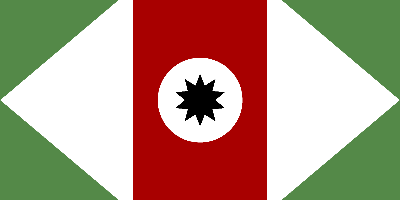The KNÃ (Kĩnã) Rebellion (4 Dez 1965 Jahr – 26 Feb 1970 Jahr)
Beschreibung:
KNÃ (Oipientian Facsist Party), Fascsist supporters, anarchists, (supported by the Fascist Bloc) vs Oipientian gov't, pro-gov't supporters, anti-fascistsOipientian gov't victory
The Oipientian Fascist Party was disbanded and the leaders of the rebellion were either imprisoned, banished, or executed. Oipientian fascism is more or less eradicated. However Ireta was declared independent
After the deposing of Tasak from the Tsĩvgalèploi, attacks from the KNÃ started against anti-fascists. However, it wasn't until the passing of Prv. 32.6 that the KNÃ declared a defensive war against the "false" government of Oipienta. 10 regions of Oipienta rebelled against the gov't. The areas that revolted, organized their own independent fascist governments. The republics that were formed were called the Iretan Republic (The Iretan Theatre), the Myosan Republic, the Kembiñk Republic (the Western Theatre), the Vulxeš Republic (Central Theatre), the Yutilan Republic (the Eastern Theatre), the Barob Republic, the Sriab Republic (The Southern Theatre), the Dícina Republic, the 2nd Velxen Republic, the Ṡvíwpentan Republic (the Velxen Theatre).
First after the outbreak of the war, the Oipientian Liberation Front (OLF) made a hard push to the town of Tãñgaṡ to try to cut off direct land contact between the Central Rebels and the Eastern Rebels. This also led to the opening of a passage way to Esaslèm, a large anti-fascist city. This push became known as the Drive For Tãñgaṡ and it culminated in the epic Battle of Tãñgaṡ. Alongside the Drive For Tãñgaṡ, the small towns of Caṡ, Tharèṡi, Alx̃i, and Aplix were liberated. Arkek proved to be the most difficult city to retake due to the Arkek Prison Complex allowing for almost perfect defensive fighting. Oipientian troops never entered the city of Arkek during the rebellion, but it only fell to Oipienta due to the years long Siege of Arkek.
The Southern Rebels were the first to surrender as they capitulated halfway through 1966 after the Fall of Atètak Sok Barob and Bècãu. Ireta's defense of its territory lasted the entire war with only minimal losses of land and no settlements taken. In fact, the Iretan rebels captured the port city of Ãñyovãlat quickly and it was never regained by Oipientian forces.
The Vnarng Illejav and Javaka provinces took the largest hits as the majority of the Vnarng Illejav settlements were captured by the Western Rebels. The Western KNÃ rebels took Mosorko in the late summer of 1967, which cut off all of Vnarng Illejav. However, in late 1968, Oipientian forces began counterattacks that would push the rebels all the way from north of Efejom Ṡob and Etèdepi to Mokavepo and Ṡoh in mid 1969. Eventually in 1970, more counterattacks from Oipienta led to a larger push from Mokavepo all the way to the Southern outskirts of Rebinèthi.
Kembiñk fell in early 1966 which led to the full collapse of the KNÃ's presence in the Kembiñk province and in the Western and Northern settlements of the Riwek Region. Eventually, once the collapse of the KNÃ in the Eastern, Southern, and most of the Western and Central theatres, the leader of the KNÃ surrendered the party and ordered an immediate ceasefire of all KNÃ fighters and supporters on February 26, 1970. The KNÃ leader, Wodov J. Hãskílis, who also led the Barob Republic, managed to escape to Nuomdeim before Barob fell. He is currently living in hiding in Pyosita
. Directly after the rebellion, the Oipientian military went to every single house and building to flush out and find all fascist members and either force them to adopt a new ideology and abandon all ideals of fascism or to be banished from Oipienta. Some were instead executed because they disobeyed the banishment orders. By 1973, Oipienta was declared Free of Fascism.
Zugefügt zum Band der Zeit:
Datum:
4 Dez 1965 Jahr
26 Feb 1970 Jahr
~ 4 years and 2 months
